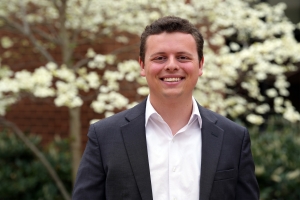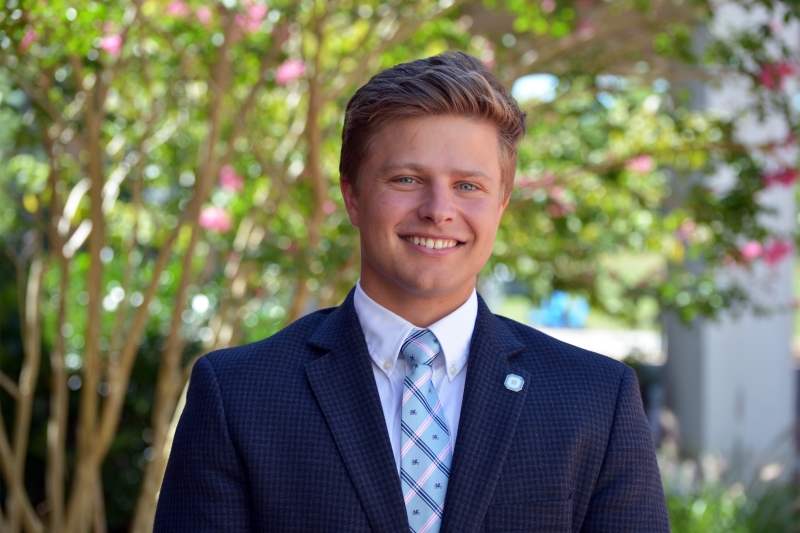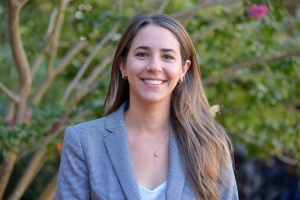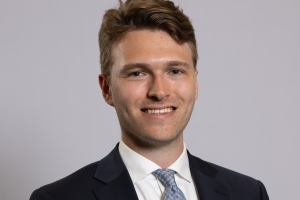
Career Paths: Jack Kellerman ’25L After graduation, Jack Kellerman will join the general litigation group at Barnes & Thornburg in Indianapolis.
Jack Kellerman ‘25L is from Indianapolis, Indiana. He attended Wabash College, where he graduated summa cum laude as a political science and rhetoric double major. After college, he joined Teach for America and taught Algebra at Title I schools in Indianapolis for four years. Jack received his Masters in the Art of Education with a focus on secondary mathematics from Marian University during his time as an educator. As a teacher, Jack was a Teach Plus Fellow and was given the “Extra Yard” Award by Indianapolis Public Schools. At W&L, he is a Managing Editor of the W&L Law Review and a caseworker in the Advanced Administrative Litigation Clinic (Black Lung Clinic). Jack is a proud member of the “Sportfeasors” flag football team, and when he has the time, he loves to play disc golf, racquetball, pickleball, and run in Lexington.
Where will you be working after graduation and in what practice area?
I will be working at Barnes & Thornburg, an “Amlaw 100” law firm headquartered in the great city of Indianapolis. I will be in their general litigation group, which will likely include work in complex commercial litigation, white-collar defense, antitrust, and toxic torts.
Did you know coming into law school that you wanted to work in this field?
I knew I wanted to read, write, argue, and continuously learn for my professional career. Naturally, I found myself gravitating towards litigation. I came in dreaming of working in appellate litigation (and would still love to), but I did not have a settled idea of which practice area. I had no idea there were “different types” of attorneys until the second semester of my law school career. Before law school, I thought all attorneys were “litigators” and was unfamiliar with what a “transactional” attorney was. W&L does a fantastic job—through the Office of Career Strategy and their community—helping you find your practice area, geographical location, and the ultimate decision between litigation and transactional work.
What role did the size and location of the firm play in the search and decision process?
Candidly, these two factors were the two major drivers of why I selected W&L Law as well as the firms I applied to for the 2L summer. W&L has a fantastic track record with placing students in “Big Law” as their first destination (if they so desire). Proof is in the pudding—look up their NALP disclosures yourself.
As for selection process of firms, size was important to me based on the experiences shared by alumni who talked about the mentorship opportunities, the sophistication of clients, and the type of cases one gets to work on in larger firms. I applied to only Amlaw 100 firms, which are the 100 biggest firms based on total revenue and commonly used as a metric for determining whether a firm is “Big Law.”
Location was important to me for three reasons. One, only certain cities have certain sized firms, so I knew I wanted to be in a larger city. Two, geographical markets to some degree influence the type of work firms work on, i.e., Washington, D.C. has a lot of regulatory and antitrust work, New York has a lot of finance-related work, and Los Angeles has a lot of entertainment work. Three, I either wanted to be in either Washington, DC, Charlotte, or Indianapolis based on the first two reasons as well as the tertiary consideration of friends and family located in these cities.
Ultimately, I am thankful that W&L (and the respective employers) afforded me the opportunity to have a choice between Washington, DC and Indianapolis. To know me is to know I am a proud Hoosier, and that I am deeply close with my family. The choice all but made itself.
Was there anything in your law school or summer job experience that confirmed this career choice?
Yes. I remember vividly the first meeting with an administrative law judge I worked under during my time as a summer law clerk for the Civilian Board of Contract Appeals. She was an impressive, highly credentialed board judge with decades of experience in government contracts. I reported the facts of the case and the law related to the facts. She asked me: “Well what do you think the right answer is based on all this?” I was shocked. I did not think my opinion mattered. Who am I, someone who has taken a year’s worth of law classes with no real legal experiences, to have an opinion? Nonetheless, I told her my initial impression. She said, “I agree, could you draft the initial draft of the opinion for me?” The excitement of learning new material and law, applying it to a legal draft, and becoming proud of a finished product reinforced litigation is where I am supposed to be.
Arguing antitrust law in front of Judge Ginsburg, a prominent jurist from the D.C. Circuit Court of Appeals, alongside Jack Perryman through a moot court competition also affirmed my interest in litigation. Discussing case law written by Judge Ginsburg’s former professor, Judge Richard Posner of the Seventh Circuit, was a surreal experience.
What classes do you think are helpful to prepare for this job?
Legal research and legal writing courses are invaluable. They are transferable and applicable to every task you do as summer associate (and I assume that will not change as a junior associate) no matter which type of attorney you become (litigation or transactional) or which practice area you specialize in. While it is easy to focus on “doctrinals” (courses teaching the core substance of legal principles) during your 1L experience, students cannot neglect the time and attention afforded to legal writing and research.
Can you describe the job search process?
I think context in the evolution of on campus interviews (“OCIs”) is appropriate here. Before the pandemic, it is my understanding most “big law” interviews took place a few weeks before the start of one’s 2L year. It was bad form for firms to interview candidates “pre-OCI” as it created a perverse incentive for other firms to follow suit in, ultimately undermining the whole process.
The pandemic changed the job search process. Pre‑OCI, this once taboo recruiting tactic became more acceptable. During my experience applying to firms in the summer of 2023, I had a few pre‑OCI interviews, but most of my opportunities came through OCI (all but two of my “call back” interviews were through OCI). For me, it felt like I had two bites at the apple, and OCI was the second bite.
It’s my understanding now, however, that pre‑OCI is more common and earlier. While I felt making a decision in the summer of my 1L year for the summer of my 2L year, and presumptively where I would go thereafter, felt early, 1Ls now seem to have to make that decision even earlier, such as the winter or early spring of their 1L year.
This is a lot of throat clearing to emphasize that starting the job search for your 2L summer should start soon after your first semester grades are finalized (and even sooner if you are in a market like Texas).
As for the process itself, it was a lot of emailing and subsequent conversations over Zoom meetings, telephone calls, or a warm cup of coffee with alumni from both my undergraduate and W&L discussing their experiences at the firm. For the interviews and ultimate selection of which offer you accept, it is a variant of rushing a Greek organization. The organization—and you—are both ensuring that not only you are qualified and competent, but that you—and them—are a good “fit” for the culture of the firm.
The process itself was fairly standardized for all but one firm. I had a thirty-minute “screener” interview with an attorney or two from the firm. If the firm thought I might be a good fit, I would get a “call back” interview, where I would travel to the firm for two to three hours of more interviews where I talked with one to two attorneys for thirty-minute blocks. Then, I would hear back a few weeks later if I got an offer. One firm, Barnes & Thornburg, skipped the screener and gave me an offer immediately after the “call-back” interview. This left quite the impression and undoubtably pressed the thumb on the scale for my ultimate acceptance of their offer. It was great feeling valued during such a stressful process.
What are you most looking forward to about this job?
I am excited to start my legal career and develop my skills as an attorney. From discovery requests to motions, I look forward to digesting the interesting subject matters I get the privilege of working on and working with the impressive attorneys I get to learn from.
Outside Law School
Hobby
I enjoy playing “eclectic” sports, i.e., disc golf, racquetball, pickleball, and rock climbing.
Favorite Location in Lexington/W&L Campus
W&L Disc Golf Course is my sanctuary after a long day in the law school (the entrance is attached to the upper lot of the Law School).
Advice for Prospective Law Student
Make time for physical and mental wellness—your G.P.A. will thank you.
Something/Someone you will miss at W&L Law
The list is too long and non-exhaustive. I’ll miss professors I’ve grown to deeply admire, including (but not limited to) Professors Trammell, Drumbl, Fairfield, and Belmont. I’ll miss seeing my law school‑turned‑lifelong friends on a daily basis including (but not limited to) Spencer Thomas, Jacob Kansco, Matthew Radford, Arthur Rosander, and all the members of our flag football team.
 Jack Kellerman ’25L
Jack Kellerman ’25L


You must be logged in to post a comment.